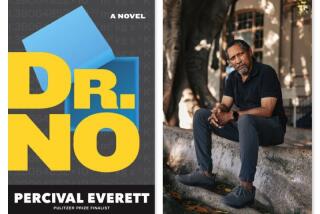The good old days of e-commerce
Amazonia
Five Years at the Epicenter of the Dot.Com Juggernaut
James Marcus
The New Press: 264 pp., $24.95
*
“Amazonia” by James Marcus isn’t the first book written about Amazon, the Seattle-based online company that has transformed bookselling. It likely won’t be the last, given the continuing evolution of its trailblazing e-commerce model and its ebullient founder, Jeff Bezos.
“Get Big Fast” by Robert Spector concentrated on the business aspects; former customer service rep Mike Daisey wrote “21 Dog Years: Doing Time @ Amazon.com” and a sequel subtitled “A Cube Dweller’s Tale,” material he has since adapted into a one-man comedy show. Former marketing manager Mara Friedman has contributed “Amazon.com for Dummies.”
Now Marcus, one of Amazon’s first editors (and the 55th employee hired), offers sharply drawn insights into the company’s early years and shows what it was like to be on the intense and chaotic front lines. It was an exciting place to work in 1996, he writes. Exhausted employees seemed giddy to be part of such a freewheeling, cutting-edge enterprise. The haphazard, do-it-yourself atmosphere seemed charming. These days, Amazon is a multibillion-dollar company, reportedly profitable at last, a ship run far more tightly and more conventionally than in the days Marcus recalls fondly as a time before efficiency and the bottom line overtook creativity and innovation.
“Amazonia” is not a bitter, vengeful, gossip-dishing memoir. Nor is it a hagiography akin to “The Perfect Store,” Adam Cohen’s too-sunny look at EBay, which could have been written by the company’s own public relations department. Think of Marcus’ book as both a candid memoir and a print complement of sorts to 1999’s “Office Space,” the savvy indie film that garnered a cult following among cynical cubicle dwellers fed up with office politics and corporate creepiness. He says he joined Amazon as an idealist inspired by the promise of a utopian environment where everything was being built from scratch; over time, as the culture grew more controlled and tense, he became disillusioned and left to save his integrity.
But to begin at the beginning, 1996: Marcus, feeling overdressed in jacket and tie, recalls arriving at a messy, casual office, where a receptionist sat at a crude wooden desk. “[T]he atmosphere of the place was so anticorporate that she seemed merely decorative,” he writes, “and it struck me that a toddler could have breached the security cordon.”
Marcus found the small, sandy-haired Bezos “a likeable and normal person” and “succumbed to his brand of anticharismatic charisma ... [which] seemed just right for our nerd-driven meritocracy.” Bezos, he writes, has “none of Bill Gates’ pasty paranoia, nor would he be likely to build a floating Xanadu in the manner of [Oracle Corp. founder] Larry Ellison. No doubt he was, and is, as ambitious as either of these empire builders. Yet the habit of humorous self-effacement kept his Napoleonic side under wraps.”
The company, open less than a year, already had outgrown its first headquarters, Bezos’ garage. By 1999, after a period of phenomenal growth, the staff had swollen to nearly 8,000. Marcus recalls strolling down warehouse aisles one day, marveling at stacks of books waiting to be shipped and surprised by how many customers, “encouraged by the blessed anonymity of the online experience,” had ordered a wide variety of sexually oriented handbooks.
Marcus describes frenetic days of cranking out thousands of reviews, articles and interviews while working among computer geeks and fellow book lovers for meager pay. Rather than chart the tech boom-and-bust era of the late ‘90s, he recounts his own experiences and responses to the company’s exponential growth, even the toll it took on his personal life, including his marriage. He is critical of its expansion into selling music, clothes, electronics, toys and even jewelry.
Eventually, Marcus begins to feel “dull and tired” as his tasks multiply, including interviewing prospective employees. Bezos, on a hiring binge to beef up the company fast, relies “too heavily on the resume as an intellectual dipstick.” And when Bezos proclaims at a retreat that the company will become a “Culture of Metrics,” strictly tracking every customer click and purchase, not to mention department productivity, Marcus finds himself thinking he has had enough. Office politics, once a stranger at Amazon, becomes an unpleasant part of the routine as the company evolves into a hyper- efficient, almost Orwellian commerce machine. The fun is over.
Even so, Marcus isn’t out to vilify. Though he offers a smart, jaded, witty take on the transformation, he refuses to draw any firm conclusions. “Until the last word is in on the Earth’s Biggest or Largest or Most Transcendental Bookstore, I’m willing to split the difference.”
More to Read
Sign up for our Book Club newsletter
Get the latest news, events and more from the Los Angeles Times Book Club, and help us get L.A. reading and talking.
You may occasionally receive promotional content from the Los Angeles Times.






